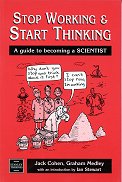This book attempts to provide that by persuading the reader to take a step back from the humdrum or obvious and look at their projects from beginning to end, before it is even begun! The experimentalist should think!
Stop Working & Start Thinking is supported by real-life examples that encourage the ability to ask the right questions and highlight the pitfalls so often encountered in scientific investigation. By the time you have read this book, you should have a great understanding of the reality of experimental investigation: from design of experiments, through analysis and interpretation of data, and to presentation of results.
This is an appropriate book for students wishing to make their M.Sc. more masterful and their Ph.D. more philosophical!
This is a book of advice to students about to embark on their first research, for a PhD. It covers the obvious areas, such as use of statistics, and how to write a paper and give a presentation, with most of the examples and anecdotes drawn from the biological sciences. However, the meat of the book, the philosophical core, if you will, is generally applicable, both to other areas of experimental research, and to researchers somewhat later in their career than studying for a PhD.
It starts with an introduction of some well-known puzzles, including deducing the colour of the bear, and the Monty Hall problem, in order to help examine assumptions, and get a feel for how paradoxical probability can be. (There is also an example about a pay rise that is bizarrely incorrect.)
After the introduction, the book settles down to its core message, of science being about asking good questions, and of experiments being about making good observations or measurements that help decide good questions. It emphasises that it is very important to understand the measurements being made, particularly if they are automated, and to understand how the choice of measurements affects what can be discovered.
It goes on to discuss various statistical approaches, the importance of raw data, and why statistical analysis is important, and needs to be understood, rather than simply done by rote.
But the philosophical core is about the difference between biology, sociology etc, and physical sciences. This key difference is the role, and origin, of variability. Most physical experiments try to reduce or control variability, because it is caused by experimental error; in biology variability is an intrinsic property of organisms, often the feature of interest to be studied, and so attempts to reduce it may produce results of such limited scope as to be worthless.
However, variability is an intrinsic part of the system and should often be included and examined explicitly.
This is all very interesting, and helps to explain a key difference between the physical and biological sciences, and why techniques from one might not be readily applicable to the other. Yet in places some of the description and explanation seem rather over-condensed, particularly for its intended audience. Given how short the book is – barely more than 100 pages – I feel it would be greatly improved by being about, say, half as long again, with the authors explaining rather more of their interesting and important core philosophy.
